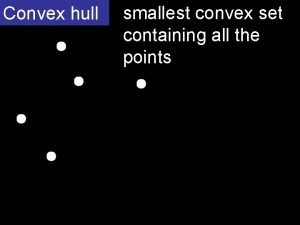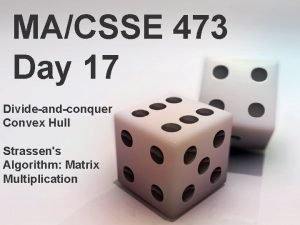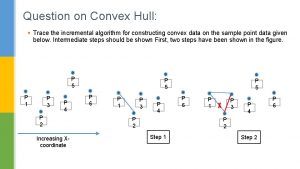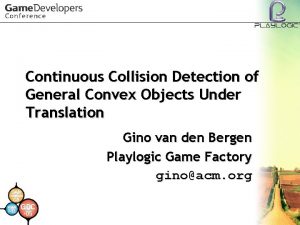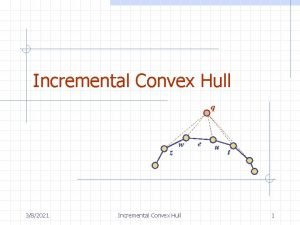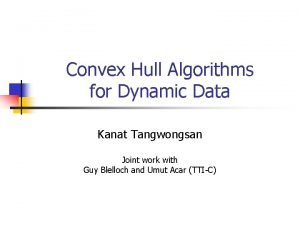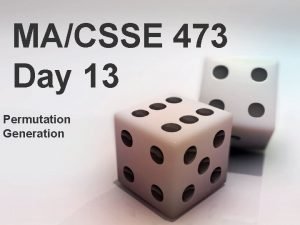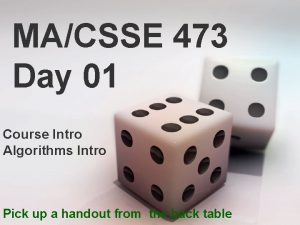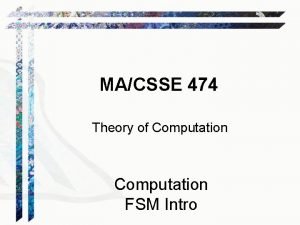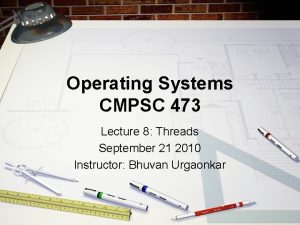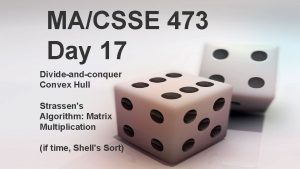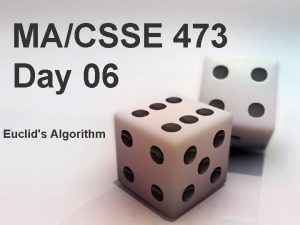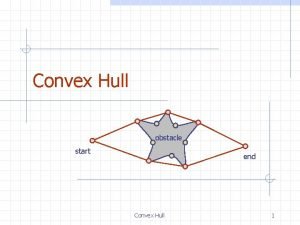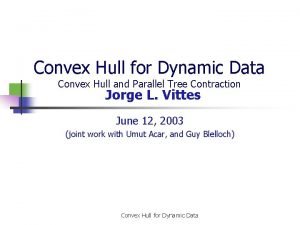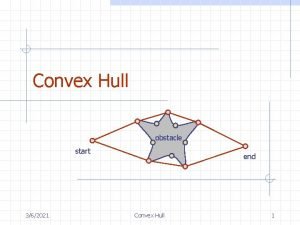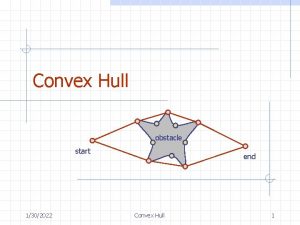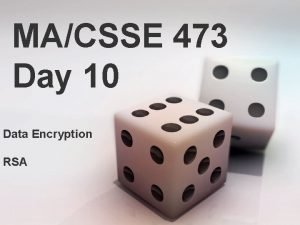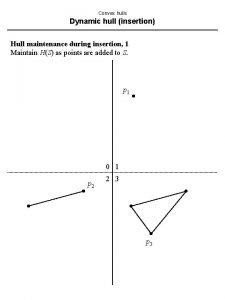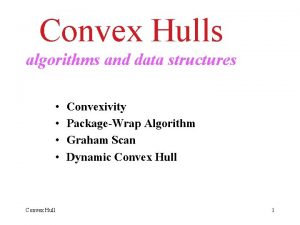MACSSE 473 Day 17 Divideandconquer Convex Hull Strassens









![Strassen’s Matrix Multiplication Strassen observed [1969] that the product of two matrices can be Strassen’s Matrix Multiplication Strassen observed [1969] that the product of two matrices can be](https://slidetodoc.com/presentation_image_h/ea54ec360b0d19084364d720f49a5e5e/image-10.jpg)



- Slides: 13

MA/CSSE 473 Day 17 Divide-and-conquer Convex Hull Strassen's Algorithm: Matrix Multiplication

Exam results

MA/CSSE 473 Day 17 • Student Questions • Convex Hull (Divide and Conquer) • Matrix Multiplication (Strassen)

Reminder: The Master Theorem • The Master Theorem for Divide and Conquer recurrence relations: • Consider T(n) = a. T(n/b) + Ѳ(nk) • The solution is (40 is the highest possible) – Ѳ(nk log n) – Ѳ(nlogba) if a < bk if a = bk if a > bk

Convex Hull Problem • Again, sort by x-coordinate, with tie going to larger y-coordinate.

Recursive calculation of Upper Hull

Simplifying the Calculations We can simplify two things at once: • Finding the distance of P from line P 1 P 2, and • Determining whether P is "to the left" of P 1 P 2 – The area of the triangle through P 1=(x 1, y 1), P 2=(x 2, y 2), and P 3=(x 3, ye) is ½ of the absolute value of the determinant • For a proof of this property, see http: //mathforum. org/library/drmath/view/55063. html • How do we use this to calculate distance from P to the line? – The sign of the determinant is positive if the order of the three points is clockwise, and negative if it is counterclockwise • Clockwise means that P 3 is "to the left" of directed line segment P 1 P 2 • Speeding up the calculation

Efficiency of quickhull algorithm • What arrangements of points give us worst case behavior? • Average case is much better. Why?

Ordinary Matrix Multiplication How many additions and multiplications are needed to compute the product of two 2 x 2 matrices? [ ][ ][ ] C 00 C 01 A 00 A 01 = C 10 C 11 B 00 B 01 * A 10 A 11 B 10 B 11
![Strassens Matrix Multiplication Strassen observed 1969 that the product of two matrices can be Strassen’s Matrix Multiplication Strassen observed [1969] that the product of two matrices can be](https://slidetodoc.com/presentation_image_h/ea54ec360b0d19084364d720f49a5e5e/image-10.jpg)
Strassen’s Matrix Multiplication Strassen observed [1969] that the product of two matrices can be computed as follows: [ ][ ] [ C 00 C 01 A 00 A 01 = C 10 C 11 B 00 B 01 * A 10 A 11 M 1 + M 4 - M 5 + M 7 B 10 B 11 M 3 + M 5 = M 2 + M 4 ] M 1 + M 3 - M 2 + M 6 Values of M 1, M 2, … , M 7 are on the next slide

Formulas for Strassen’s Algorithm M 1 = (A 00 + A 11) (B 00 + B 11) M 2 = (A 10 + A 11) B 00 M 3 = A 00 (B 01 - B 11) M 4 = A 11 (B 10 - B 00) M 5 = (A 00 + A 01) B 11 M 6 = (A 10 - A 00) (B 00 + B 01) M 7 = (A 01 - A 11) (B 10 + B 11) How many additions and multiplications?

The Recursive Algorithm • We multiply square matrices whose size is a power of 2 (if not, pad with zeroes) • Break up each matrix into four N/2 x N/2 submatrices. • Recursively multiply the parts. • How many additions and multiplications? • If we do "normal matrix multiplication" recursively using divide and conquer? • If we use Strassen's formulas?

Analysis of Strassen’s Algorithm If N is not a power of 2, matrices can be padded with zeros. Number of multiplications: M(N) = 7 M(N/2) + C, M(1) = 1 Solution: M(N) = (Nlog 27) ≈ N 2. 807 vs. N 3 of brute-force algorithm. What if we also count the additions? Algorithms with better asymptotic efficiency are known but they are even more complex.
